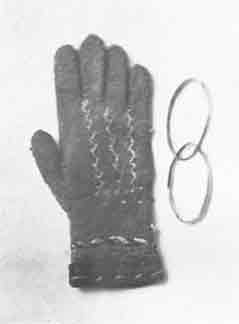The Story of Beaumont
The First Cotton in Texas
THOUGH most of the early settlers raised cattle, paying little attention to soil cultivation, it was in Jefferson county that the first cotton in Texas was raised. In 1834 Joseph Grigsby came to the county from Green River, Kentucky, and located his league on the Neches river at Grigsby Bluff, now Port Neches. Here he planted and raised the first cotton ever grown in the state. Joseph Grigsby was one of the wealthiest men of the section, owning about fifty slaves, and he was a member of the company that laid out the town of Beaumont.
Joseph Grigsby's daughter, Miss Frances Grigsby, married George W. Smyth, one of the early prominent men of the section, who lived at Smith Bluff now the site of the Pure Oil Refinery. They rode seventy-five miles to Nacogdoches on horseback to be married by a priest. Dr. Joe Smith, a descendant of this couple, has in his possession a prized little kid glove, the picture of which is here reproduced in actual size. Following the custom of the day, dating probably from the ancient custom of ladies presenting their knights with tokens, Frances Grigsby made this dainty little glove as a love token for George W. Smyth. He carried it with him always, and after his death Mrs. Smyth used the little glove as a case for their two wedding rings.

A Love Token
Mr. Smyth took an active part in public affairs of this section and state. He served under the Mexican government as surveyor and commissioner of titles, was a delegate to the convention that declared Texas an independent state, and was one of the signers of the Texas declaration of independence. When Texas became a republic President M. B. Lamar appointed him to run the boundary line between the Republic of Texas and the United States, and he was later elected second land commissioner of the state. He also served as first congressman from the East Texas district, serving two years, and was a member of the convention for the reinstating of Texas into the Union following the Civil War. Mr. Smyth was ill when this convention was called, but having been chosen by the people to represent them, he refused to let his illness keep him from attending the convention. He died while in attendance and is buried in the state cemetery at Austin.
An index to other early settlers of the town is shown in the minutes of the county court of May 31, 1837, listing the names of all citizens who were land-owners and subject to jury service in the county at that time. Thomas Brenan was clerk of the court, William Stephenson sheriff, and G. A. Patillo an associate justice.
The list of all citizens who were free-holders and subject to act as jurors included: James Stephenson, William T. Hatton, C. C. P. Welsh, R. Ballue, Uriah Gibson, Joseph Ritchie, Isaac Garner, Uriah Harris, D. St. Clair, Gilbert Stephenson, James Dyson, Elisha Stephenson, Marmaduke Hatton, David Harmon, William Hays, Elisha Allen, William Clark, John Blanc, Charles Myers, James Simmons, William Hatton, Jr., James Wan, James Jett, John Harmon, Elijah Allen, Clairborn West, A. Jett, Wilson Sill, John Townsend, Benjamin Johnson, William McFaddin, David Garner, Stephen Simmons, Robert Hatton, Thomas Rowe, Jacob Garner, Charles Crow, W. D. Smith, John Stephenson, Abraham Winfrey, B. Arthur, John Cole, W. H. Irion, John Caruthers, Clark Beach, George Allen, Silas Parmer, Joseph Young, N. Holbert, J. T. Robison, Peyton Blanc, Thomas Heart, Charles Cohorn, S. N. Mathies and Aaron Allen.
These fifty-six constituted the majority of the citizens of the county at this date, and the county at this time included what is now Jefferson, all of Orange and part of Hardin county also.